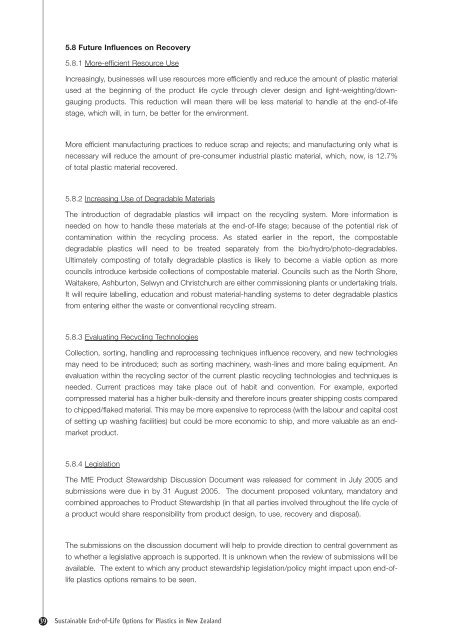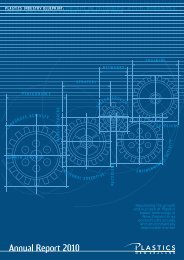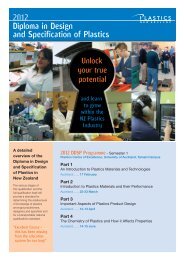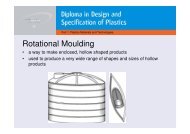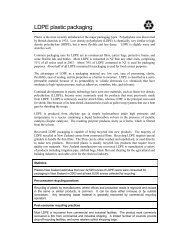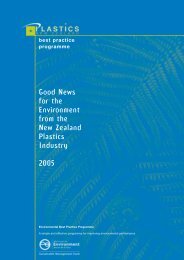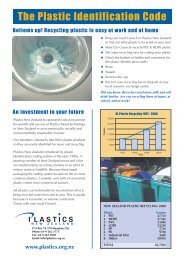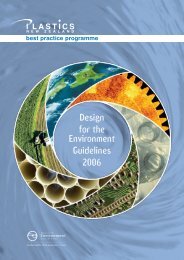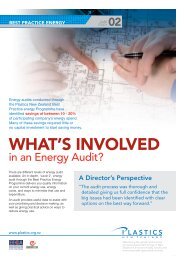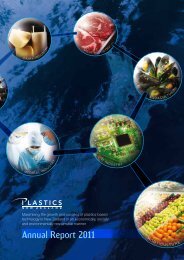Sustainable End-of-Life Options for Plastics in New Zealand
Sustainable End-of-Life Options for Plastics in New Zealand
Sustainable End-of-Life Options for Plastics in New Zealand
You also want an ePaper? Increase the reach of your titles
YUMPU automatically turns print PDFs into web optimized ePapers that Google loves.
5.8 Future Influences on Recovery<br />
5.8.1 More-efficient Resource Use<br />
Increas<strong>in</strong>gly, bus<strong>in</strong>esses will use resources more efficiently and reduce the amount <strong>of</strong> plastic material<br />
used at the beg<strong>in</strong>n<strong>in</strong>g <strong>of</strong> the product life cycle through clever design and light-weight<strong>in</strong>g/downgaug<strong>in</strong>g<br />
products. This reduction will mean there will be less material to handle at the end-<strong>of</strong>-life<br />
stage, which will, <strong>in</strong> turn, be better <strong>for</strong> the environment.<br />
More efficient manufactur<strong>in</strong>g practices to reduce scrap and rejects; and manufactur<strong>in</strong>g only what is<br />
necessary will reduce the amount <strong>of</strong> pre-consumer <strong>in</strong>dustrial plastic material, which, now, is 12.7%<br />
<strong>of</strong> total plastic material recovered.<br />
5.8.2 Increas<strong>in</strong>g Use <strong>of</strong> Degradable Materials<br />
The <strong>in</strong>troduction <strong>of</strong> degradable plastics will impact on the recycl<strong>in</strong>g system. More <strong>in</strong><strong>for</strong>mation is<br />
needed on how to handle these materials at the end-<strong>of</strong>-life stage; because <strong>of</strong> the potential risk <strong>of</strong><br />
contam<strong>in</strong>ation with<strong>in</strong> the recycl<strong>in</strong>g process. As stated earlier <strong>in</strong> the report, the compostable<br />
degradable plastics will need to be treated separately from the bio/hydro/photo-degradables.<br />
Ultimately compost<strong>in</strong>g <strong>of</strong> totally degradable plastics is likely to become a viable option as more<br />
councils <strong>in</strong>troduce kerbside collections <strong>of</strong> compostable material. Councils such as the North Shore,<br />
Waitakere, Ashburton, Selwyn and Christchurch are either commission<strong>in</strong>g plants or undertak<strong>in</strong>g trials.<br />
It will require labell<strong>in</strong>g, education and robust material-handl<strong>in</strong>g systems to deter degradable plastics<br />
from enter<strong>in</strong>g either the waste or conventional recycl<strong>in</strong>g stream.<br />
5.8.3 Evaluat<strong>in</strong>g Recycl<strong>in</strong>g Technologies<br />
Collection, sort<strong>in</strong>g, handl<strong>in</strong>g and reprocess<strong>in</strong>g techniques <strong>in</strong>fluence recovery, and new technologies<br />
may need to be <strong>in</strong>troduced; such as sort<strong>in</strong>g mach<strong>in</strong>ery, wash-l<strong>in</strong>es and more bal<strong>in</strong>g equipment. An<br />
evaluation with<strong>in</strong> the recycl<strong>in</strong>g sector <strong>of</strong> the current plastic recycl<strong>in</strong>g technologies and techniques is<br />
needed. Current practices may take place out <strong>of</strong> habit and convention. For example, exported<br />
compressed material has a higher bulk-density and there<strong>for</strong>e <strong>in</strong>curs greater shipp<strong>in</strong>g costs compared<br />
to chipped/flaked material. This may be more expensive to reprocess (with the labour and capital cost<br />
<strong>of</strong> sett<strong>in</strong>g up wash<strong>in</strong>g facilities) but could be more economic to ship, and more valuable as an endmarket<br />
product.<br />
5.8.4 Legislation<br />
The MfE Product Stewardship Discussion Document was released <strong>for</strong> comment <strong>in</strong> July 2005 and<br />
submissions were due <strong>in</strong> by 31 August 2005. The document proposed voluntary, mandatory and<br />
comb<strong>in</strong>ed approaches to Product Stewardship (<strong>in</strong> that all parties <strong>in</strong>volved throughout the life cycle <strong>of</strong><br />
a product would share responsibility from product design, to use, recovery and disposal).<br />
The submissions on the discussion document will help to provide direction to central government as<br />
to whether a legislative approach is supported. It is unknown when the review <strong>of</strong> submissions will be<br />
available. The extent to which any product stewardship legislation/policy might impact upon end-<strong>of</strong>life<br />
plastics options rema<strong>in</strong>s to be seen.<br />
39 <strong>Susta<strong>in</strong>able</strong> <strong>End</strong>-<strong>of</strong>-<strong>Life</strong> <strong>Options</strong> <strong>for</strong> <strong>Plastics</strong> <strong>in</strong> <strong>New</strong> <strong>Zealand</strong>


